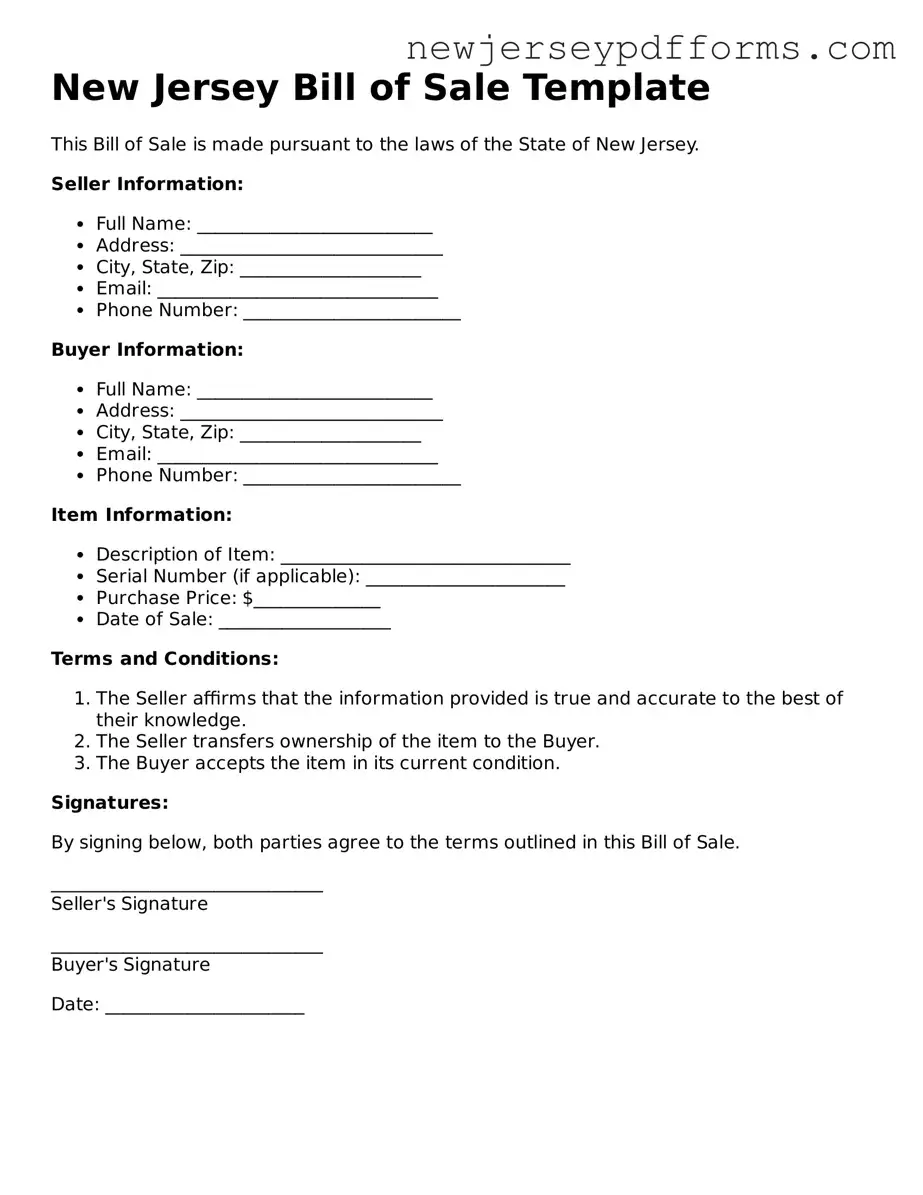The Vehicle Title Transfer form serves a similar purpose to the New Jersey Bill of Sale. This document is essential when ownership of a vehicle changes hands. It includes details such as the vehicle identification number (VIN), make, model, and the names of both the seller and buyer. Like the Bill of Sale, it provides proof of the transaction and is often required for registration purposes with the state motor vehicle department.
The Personal Property Bill of Sale is another document that shares similarities with the New Jersey Bill of Sale. This form is used for the sale of personal items, such as furniture, electronics, or collectibles. It includes a description of the items sold, the sale price, and the names of the parties involved. Both documents serve as evidence of the transfer of ownership and help to protect the rights of both the buyer and seller.
Understanding the various documents related to transactions is imperative for effective communication and protection in any deal. For example, a PDF Document Service can provide assistance when navigating the complexities of transactions requiring proof of ownership or financial history, ensuring that all parties are on the same page.
The Equipment Bill of Sale is specifically designed for the sale of business or industrial equipment. It details the equipment's specifications, condition, and sale price. Similar to the New Jersey Bill of Sale, this document provides a record of the transaction and can be used for tax purposes or in case of disputes regarding ownership.
The Boat Bill of Sale is a specialized version of the Bill of Sale used for transferring ownership of boats and watercraft. It includes information such as the boat's hull identification number (HIN), make, model, and sale price. Like the New Jersey Bill of Sale, it serves as a legal record of the transaction and is often required for registration with state authorities.
The Firearm Bill of Sale is another document that functions similarly to the New Jersey Bill of Sale. This form is used when firearms are bought or sold. It typically includes details about the firearm, such as make, model, and serial number, as well as the names and signatures of both parties. This document is important for legal compliance and serves as proof of the transfer of ownership.
The Mobile Home Bill of Sale is utilized for the sale of mobile homes. It contains information about the mobile home, including its identification number, dimensions, and sale price. Just like the New Jersey Bill of Sale, it provides legal documentation of the transfer and is often required for registration with local authorities.
The Antique Vehicle Bill of Sale is specifically tailored for the sale of antique or classic cars. This document includes details about the vehicle's age, condition, and sale price. It functions similarly to the New Jersey Bill of Sale by providing proof of ownership transfer, which is crucial for registration and insurance purposes.
The Livestock Bill of Sale is used when livestock is sold or transferred. It includes information about the type and number of animals, as well as the sale price. This document serves a similar purpose to the New Jersey Bill of Sale by providing a legal record of the transaction, which can be important for tracking ownership and health records.
The Business Sale Agreement is another document that parallels the New Jersey Bill of Sale. It is used when an entire business is sold, detailing the assets included in the sale, such as equipment, inventory, and goodwill. This agreement provides a comprehensive record of the transaction, similar to how the Bill of Sale documents the transfer of personal property.
Lastly, the Lease Agreement can be considered similar in that it outlines the terms under which property is rented or leased. While it does not transfer ownership, it provides a legal framework for the use of property. Both documents are essential for protecting the rights of the parties involved and ensuring compliance with state laws.

